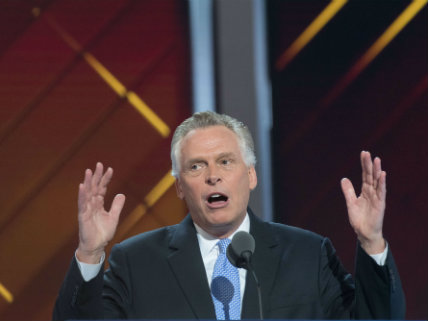Virginia Governor Working at an Unrealistic Pace to Restore Felons' Voting Rights
In two months, Gov. Terry McAuliffe says he's reviewed and signed 13,000 individual executive orders.

For the second time this year, Gov. Terry McAuliffe is trying to assert his executive authority to restore the voting rights of released felons in Virginia.
After being told by the state Supreme Court that he did not have the authority to restore voting rights to all of Virginia's 200,000 ex-felons with a single stroke of his pen, McAuliffe says he's now going about the process one-by-one. On Monday in Richmond, McAuliffe announced that he'd already signed 13,000 individual orders to restore voting rights to former convicts, The Hill reports.
If that's true, he's doing it with unbelievable speed.
Here's the background: McAuliffe signed an executive order in April granting voting rights to an estimated 200,000 ex-felons living in Virginia. Republicans sued, and in July the state Supreme Court ruled that McAuliffe overstepped his authority.
"The Governor can use his clemency powers to mitigate a general rule of law on a case-by-case basis," Chief Justice Donald Lemons wrote in the majority opinion. "But that truism does not mean he can effectively rewrite the general rule of law and replace it with a categorical exception. The express power to make exceptions to a general rule of law does not confer an implied power to change the general rule itself."
Approximately 750 hours have passed since the state Supreme Court issued that ruling on July 22, telling McAuliffe he had to tackle this issue on a case-by-case basis.
Even if McAuliffe worked around-the-clock on nothing else since then, he would have had to evaluate about 17 ex-convicts per hour, every hour. That's an average of one case every three minutes or so, if he didn't take any breaks to eat or sleep.
He says he's passionate about this issue—that's fine, but even passion can't slow the passage of time.
When the Supreme Court decision was issued, the New York Times noted that McAuliffe would have to sign 385 orders per day for the rest of his term to restore voting rights to all 200,000 ex-convicts covered by his initial executive order. "Challenge accepted," seems to have been McAuliffe's response.
It's unknown whether Republicans will bring another legal challenge. If they do, math figures to be a central part of their case.
Aside from his tendency to overstep the limits of executive power (and perhaps the limits of human endurance), McAuliffe says all the right things about why he wants to restore felons' voting rights.
"These individuals are gainfully employed, they send their children and their grandchildren to our schools, they shop in our grocery stores and they pay taxes. I am not content to condemn them for eternity as inferior, second-class citizens," he said in a statement on Monday, echoing similar comments made in April when he signed the earlier order.
There are more than 2.2 million ex-convicts in America who cannot vote even though they've been released from prison. Ostensibly, they've paid their debt to society but they are still excluded from the political process. Unfortunately, the debate over whether ex-cons should be allowed to vote almost always devolves into a cynical discussion about which political party benefits from it.
Presumptive party registration and theoretical future ballots never should be a deciding factor in a debate over the basic rights within our political system. Then again, doing things the right way matters too.
If McAuliffe is being honest about his efforts here, he should be applauded. If not, then he's headed towards another showdown with the state Supreme Court and thousands of ex-felons in Virginia are caught in the middle of a cynical political game.


Show Comments (23)